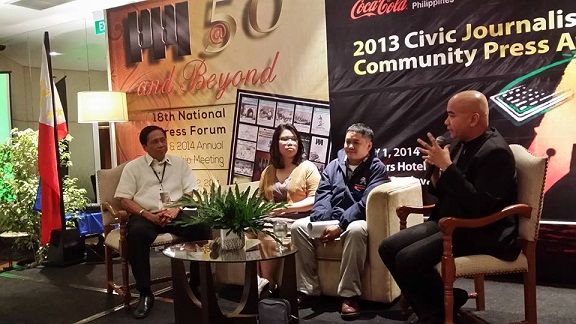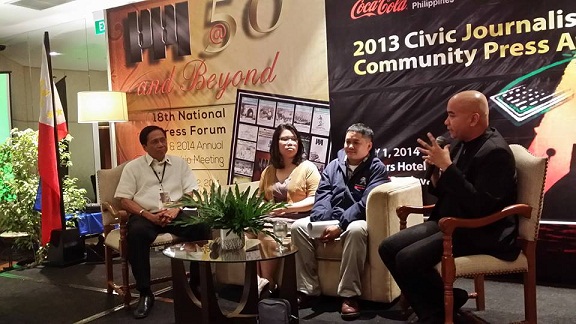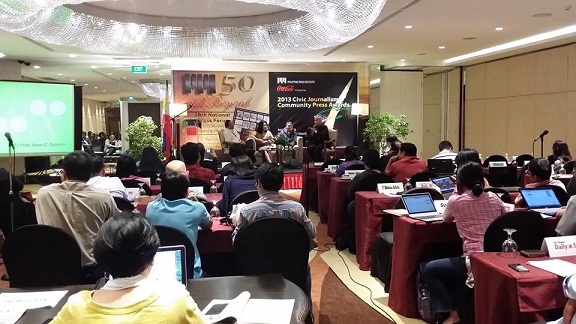By APRIL ANNE BENJAMIN
PRINT media will survive and continue to evolve despite the dominance of online media, speakers in the 18th National Press Forum of the Philippine Press Institute said Thursday.
“Newspaper will not die, instead it will evolve,” Exotech Solutions CEO Mark Cu Unjieng told the audience of about 150 members of the media and the academe.
He said the talk should not be about traditional media and online media separately but “about their convergence.”
PPI Chairperson-President Jess Dureza also said digitization of media has sharpened the challenge for “veracity, independence and accountability or VIA.”
“Social media cannot compete with the print media in terms of VIA,” says Dureza explaining that the nature of online media is what will keep it from ever passing the VIA test.
Online media is “journalism in a hurry. The process of verification somehow gets lost when social media users compete in breaking the stories. And there is no quick way to check the accountability of the content before it gets shared by the users,” the former press secretary said.
Dureza also said that often what is viral online makes its way to the traditional media
He also said the media today is still confronted with the same issues experienced 50 years ago. “[We] are still facing the same challenges since the birth (of PPI) up to the present. And these are issues about press freedom, issues about capacities, issues about advocacies, media killing issues, and now, more challenges about survival especially with the onset of the digital age,” Dureza said.
There are 28 publications that claim to have a national circulation. In a 2007 report from pressreference.com, the combined circulation of printed newspapers totaled 4.7 million copies a day. This is supposed to be a decrease considering that in the late 1990s, the figure was 7 million .
Aside from the nationally circulated papers, there are more than 600 community newspapers all over the country.
Recently, NetIndex.com revealed that the Philippines has the slowest Internet speed in Southeast Asia. Despite this, the country has a fairly good Internet penetration at 33.6 million connected to the Internet out of 92.3 million Filipinos.
This means three out of 10 Filipinos are connected to the web compared to about two out of 10 Filipinos who read the newspaper.
The survival of print media relies on its ability to generate revenues through advertisements. With the offer of faster information dissemination and greater audience at a reduced cost, online media also threatens print media in terms of readership which a major consideration for advertising placements.
The practice now is “bundled advertising” with the advertisements appearing in both print and online platforms of the newspaper for a single price since most print publications in the country have websites.
Although there are optimistic views about how online media impacts print, Aristotle Estrella, an advertising consultant, said that online media does not only endanger the printed newspapers but the entire advertising industry as well. Thus, he said that media should “go beyond selling ad space” and “provide more value” by creating partnerships with big corporations.
Estrella said companies are more likely to stay advertisers to publications that help them promote through their advocacies by running stories related to their corporate social responsibilities (CSR).
However, a member of the audience pointed out that the ethical issue in that arrangement.
Eileen Mangubat, the acting-editor-in-chief of Cebu Daily News and also one of the speakers, said to avoid ethical breaches, “the key is to be transparent and very candid with the readers.”
“If it’s a sponsored article then indicate so and do not masquerade it as news,” she said.
Mangubat explained that by labeling articles, the reader would know what it is and they will absorb it based on the labels. “They will not feel fooled or that the newspaper is bought off. They will take it exactly the way it is offered,” she said.
She said that CSR partnerships will only become a problem when the CSR partners try to interfere in the newspaper’s editorial judgment.
“When the CSR partner insists, ‘I want to be headline,’ then it’s time to say ‘I wanna talk to you.’ The CSR partner shall not dictate where which will go. When that happens, that’s time to back off,” Mangubat said.
The session ended with Dureza saying that “the print media is not yet dead, but it will be forever in the pre-departure area where new media technologies will constantly challenge its existence. But it can retain its foothold as primary source of information and opinion if it continues to have veracity, independence and accountability.
PPI is an organization of national and local newspapers with the principal mandate to defend press freedom and promote ethical standards for the professional development of the Filipino journalist.
The forum is part of the celebration of PPI’s 50th founding anniversary, which was held at the Traders Hotel Manila.
(The author is a University of the Philippines student writing for VERA Files as part of her internship.)


